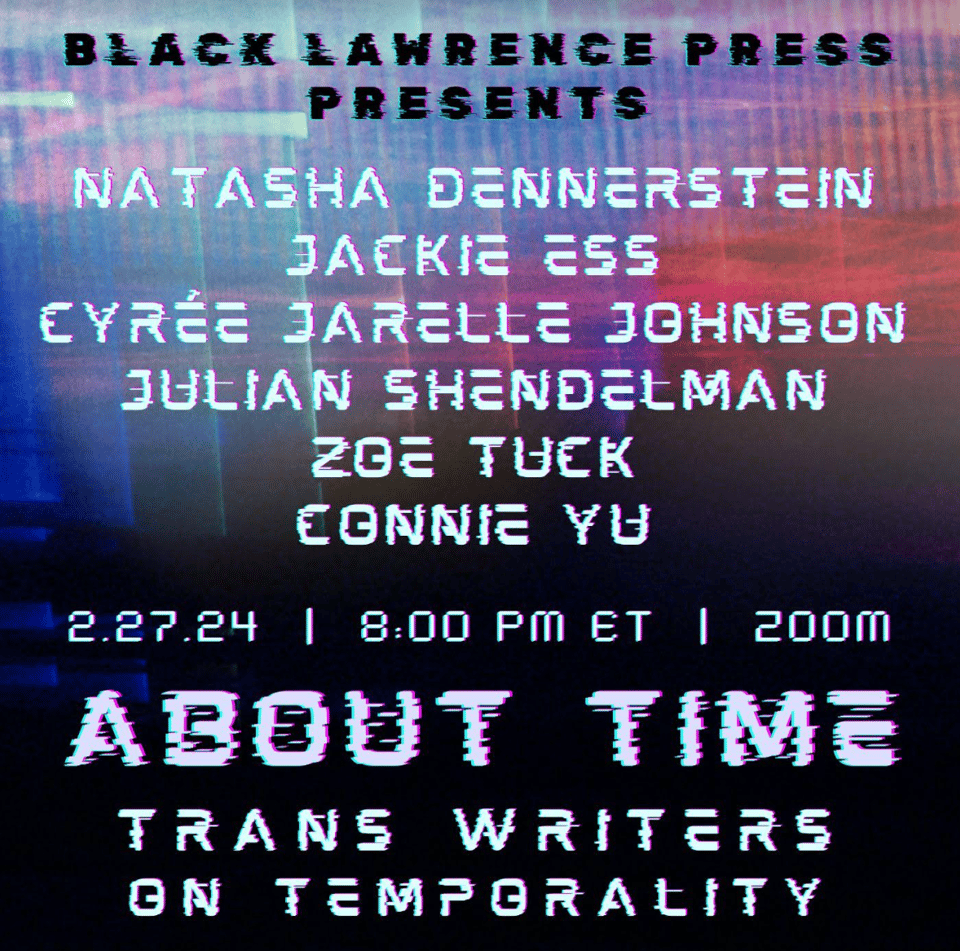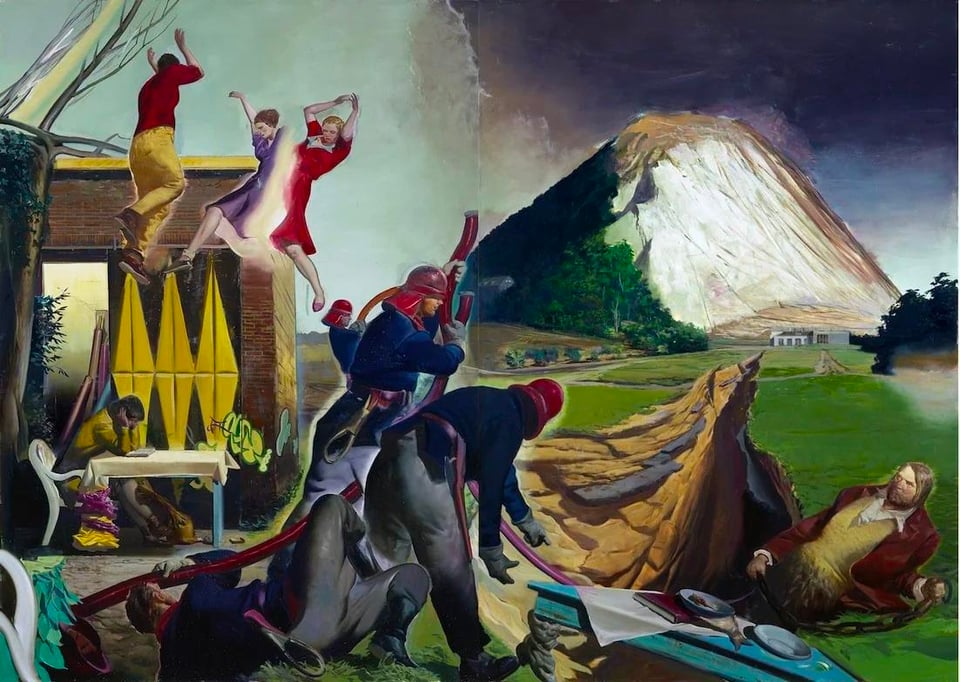A note on "Trans Temporality"
I spoke tonight at an event (2024-02-27) organized by Julian Shendelman and Black Lawrence Press, called ABOUT TIME: Trans Writers on Temporality. There were a lot of readers and I was especially impressed by Connie Yu, whose work with repetitive, bureaucratic and therapeutic speech reminded me of Holly Melgard (https://www.artforum.com/columns/jackie-ess-on-holly-melgards-fetal-position-251116/).

I wasn't sure what to do about this and decided to try to really say what I thought about this in under 2000 words. The event wasn't recorded, but I made an audio recording of my part on my phone which hopefully will attach to this message. Sort of self-indulgent freestyle philosophizing but it's also what I think. More hermeneutics, less identity.
Never to have seen it just this way: a note on trans temporality
I don’t believe that trans people have a special relationship to time. So that might be a simple rejection of the question. But perhaps the discovery which we each have to make of that fact has a particular style and group-wise trajectory. We have to figure that out. And perhaps we have to figure it out together. Though perhaps what we have to figure out is that there is no particular experience at all. And no particulars.
I’d like you to imagine three concepts of time, arranged in a triangle with its point at the bottom. In the the upper left corner, history. In the upper right, the living moment. And somewhere down there, the self, our feet of clay. The geometry is not important but we will trace it around.
Along the left side of the triangle, I could begin by telling you a few things about Haiti, where some of my family is from. You might not know, when I do, whether I am telling you something that I learned from my family or a few experiences I had there, or something that I learned from a book like Matthew J. Smith’s Red and Black in Haiti, a book which in fact I only read when I was thirty and there learned many things which when I tell you, you will wrongly assume that I knew for my whole life, by way of blood. You may assume further that, having lived a very different life, or having a different fraction of melanin, you cannot seriously engage with what I say about the topic. Perhaps you can listen, and perhaps you must listen, but this listening is totally passive. A disaster. Thought is foreclosed here, and to the extent that thought is social, some part of that thought is foreclosed for both of us. Is being trans the same way?
Here we find in the guise of a problem of identity what is actually a wavering or an ambiguity between history and the self—knowledge and standpoints—respectable historiography and the sentimental archive—all this along the left side of our time triangle: a wavering with real consequences for our ability to think and communicate. And the two perspectives inform one another in a reversible and ambiguous way. They interpenetrate. History organizes the stories of individuals, but on the other hand the reading of history is largely an individual enterprise. And my experience depends on the language of history for its articulation. I am always periodizing, or thinking for example that I know the story of this place, or what a revolution is. This is never resolved.
Along the right side of the triangle, I could tell you a few things about my life, and you, in your best impersonation of a therapist, might ask me how it really felt to feel that way. In the moment, in the body. The pit of the stomach and the back of the neck. Tingling now. You might say, “Not your judgment of the feeling, and not your dread of it. How it felt.” “Embodiment” used to be a magic word here. Gradually it ran out of magic and we had to start saying “somatic” or speaking of “trauma.” We will almost certainly need new language in the future. This is an area where language exhausts itself quickly and there ought to be more attention to that fact, the turn-over itself, which renders each generation incomprehensible to the next. This actually may be a substantial rather than accidental feature of psychic life.
In any case, we can see this as before, as a similar wavering between the self and the moment. The feeling was not only its embodied quality, but its intervention in the emotional and practical reality of my life. If I describe a something as “life-changing” that’s an index of intensity, it might be better not to ask too pointedly what the change was or even what happened. A life is made up of moments, which are in turn only meaningful in the purchase they find on a life.
The strategy proposed to us was to temporalize the feeling: the morning’s anticipation, the day’s labor, the evening’s reliving. Total phenomenological fidelity to the middle term holds out the promise of a world of permanent daylight, a Scandinavian summer in the soul, a way of dodging the Buddhist “second arrows” which arrive to split the first in two.
Looking across the top of the triangle, at the impersonal link between the moment and history, we find the problem of constructing the narrative not from the individuals but from the the events, writing the history of the present. Or in another way your memory of the earthquake might be just as much a memory of the way we all lived then. Even sunlight has its historical character, as it reflects off the new building, with the prefab glass, whose aesthetic is resisted because that is the new city which buries the old alive. Perception is dominated by signification, and that fact is perception.
It doesn’t strike me that being transgender should alter any of this, or offer any perspective on it at all. History, a life, pure duration, our three poles, continue to substitute and constitute one another, and the play of them seems somehow uncomfortable. It’s a discomfort which produces not principles but anxious scruples. These scruples, as they appear in language, are what we need to consider now. The project of securing one’s communication, of explaining one term by another, takes over and displaces what one had meant to say. And this securing project, which was taken up in anxiety, breaks off, as arbitrarily as it started, in confusion and exhaustion. We didn’t have to start, and we could have gone on forever. Both moments are misrecognized. We perceive a spurious responsibility and we fail to acknowledge the infinity of the task.
Let me return to the framing of this event. Perhaps it would be good to say a few things about how events like this are organized in general: you say yes to an old friend, or to a flattering invitation, you feel that you ought to do more events, to stay in circulation somehow, and there are always too many readers, too little time, and the real principles of curation are friendship, identity, fame, novelty, and having enough readers that their mere presence suffices for promotion. If each reader can brings along four or five listeners, the room fills up.
But we need another principle, something more conceptual. Here is the guidance we received on this point:
Crumbling journals in the archive. A thousand transition update videos. Hours spent in hospital waiting rooms. The passing of time is universal, but it holds special significance for trans people.
There isn’t much for me to say about “a thousand transition update videos” and “hours spent in hospital waiting rooms” except to make the basic point that there is nothing uniquely trans about narcissistic adaptations to a changing media environment or about difficulty with medical bureaucracy.
Let’s look at this question of “Crumbling journals in the archive.”
It seems to me that every archive is crumbling, for reasons having more to do with failing support for libraries, for scholarship in every sense, bookstores and small presses and serious journals, or reasons to do with an over-optimism about the internet, and perhaps also to the destruction of the oral record. To give an example, nearly a decade ago Julian and I started a trans writer’s workshop in the Bay Area, with a few more friends, and this was relatively easy to do. Why so? Because of a concentration of trans people, almost all of whom lived in considerably below-market rental housing and who either had roots in the area or had moved there when it was considerably easier to do so. Perhaps one effect of gentrification, and of the entropic attrition of urban scenes, and of queer infighting, and of just plain growing up, is that the individuals who made up this group this are now scattered. So our project, which was only a grain of sand but meant something to us, fails to enter what’s being called “the archive.”
We were too content, and we entrusted our memory to concentrated urban and subcultural configurations, as well as to our own energies of youth. This actually isn’t a trans problem, but it might be related to the way that so many of us seem to come up after a decade bitter and world-weary wise, with a perspective that seems frustratingly never to become shared knowledge. All of you will actually repeat our mistakes. All of you will learn every single lesson we learned the hard way. There’s a failure of memory alright, but it isn’t the Library of Alexandria we’re talking about, nor even that of Magnus Hirschfeld. The greater problem is what isn’t being written down at all, words which don’t find the page, and in thought itself which doesn’t come to the point. This is not only for the sake of history, or the so-called “archive,” but even just for the rest of us.
How can we think our thoughts all the way? What would it take for experience to become history or social knowledge? Is there one thing you’ve learned that no one will forget, or that no one will ever have to learn in the same way that you did? Another way of putting this question is: were we even here? I don’t think these are trans questions.
John Ashbery says, in the Ecclesiast:
Just now, and across the sunlight darkness is taking root anew
In intense activity. You shall never have seen it just this way
And that is to be your one reward.
So returning to the copy, “The passing of time is universal, but it holds special significance for trans people”
I think what I have said above indicates the way that I think that a statement like this can be both deeply felt, and totally false. I experience an instability in the dimension of time, which I take up in anxiety, without recognizing that this was a choice, and which I put down in dissolution, without recognizing the actually rather interesting fact that I never could have completed this project, I turn away from my turning away, either by moralizing it or more often by casting it into oblivion. But of course it is not only I but We who embark on this project and abandon it halfway through. And insofar as there is a we, we can imagine that there is something called “trans temporality.” That’s my time.
now have a tune: https://warmghost.bandcamp.com/track/myths-on-rotting-ships
—and a novel: https://gallicbooks.com/product/the-vatican-cellars
—oh and I remembered Archilochos, who deserves the treatment we reserve for Sappho and Parmenides. He's sort of our Sappho... https://briefpoems.wordpress.com/tag/archilochus/
—and remembered this painting by Neo Rauch, Die Fuge, which I saw in my early twenties and can't seem to forget

—ok, peace.